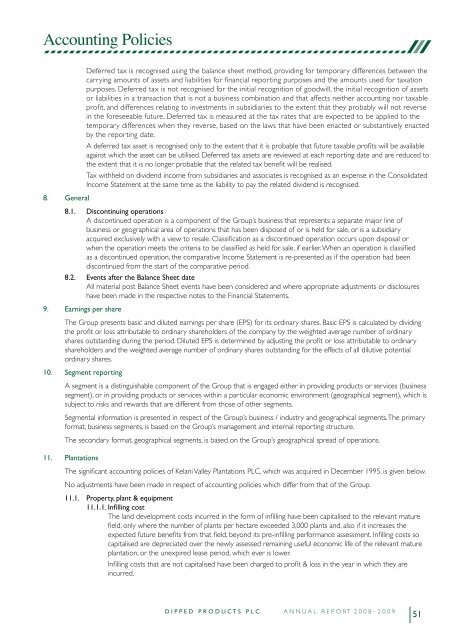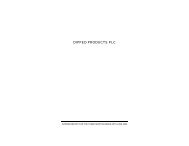DIPPED PRODUCTS PLC / ANNUAL REPORT 2008—2009
Annual Report- 2008/2009 - Colombo Stock Exchange
Annual Report- 2008/2009 - Colombo Stock Exchange
- No tags were found...
Create successful ePaper yourself
Turn your PDF publications into a flip-book with our unique Google optimized e-Paper software.
Accounting Policies<br />
Deferred tax is recognised using the balance sheet method, providing for temporary differences between the<br />
carrying amounts of assets and liabilities for financial reporting purposes and the amounts used for taxation<br />
purposes. Deferred tax is not recognised for the initial recognition of goodwill, the initial recognition of assets<br />
or liabilities in a transaction that is not a business combination and that affects neither accounting nor taxable<br />
profit, and differences relating to investments in subsidiaries to the extent that they probably will not reverse<br />
in the foreseeable future. Deferred tax is measured at the tax rates that are expected to be applied to the<br />
temporary differences when they reverse, based on the laws that have been enacted or substantively enacted<br />
by the reporting date.<br />
A deferred tax asset is recognised only to the extent that it is probable that future taxable profits will be available<br />
against which the asset can be utilised. Deferred tax assets are reviewed at each reporting date and are reduced to<br />
the extent that it is no longer probable that the related tax benefit will be realised.<br />
Tax withheld on dividend income from subsidiaries and associates is recognised as an expense in the Consolidated<br />
Income Statement at the same time as the liability to pay the related dividend is recognised.<br />
8. General<br />
8.1. Discontinuing operations<br />
A discontinued operation is a component of the Group’s business that represents a separate major line of<br />
business or geographical area of operations that has been disposed of or is held for sale, or is a subsidiary<br />
acquired exclusively with a view to resale. Classification as a discontinued operation occurs upon disposal or<br />
when the operation meets the criteria to be classified as held for sale, if earlier. When an operation is classified<br />
as a discontinued operation, the comparative Income Statement is re-presented as if the operation had been<br />
discontinued from the start of the comparative period.<br />
8.2. Events after the Balance Sheet date<br />
All material post Balance Sheet events have been considered and where appropriate adjustments or disclosures<br />
have been made in the respective notes to the Financial Statements.<br />
9. Earnings per share<br />
The Group presents basic and diluted earnings per share (EPS) for its ordinary shares. Basic EPS is calculated by dividing<br />
the profit or loss attributable to ordinary shareholders of the company by the weighted average number of ordinary<br />
shares outstanding during the period. Diluted EPS is determined by adjusting the profit or loss attributable to ordinary<br />
shareholders and the weighted average number of ordinary shares outstanding for the effects of all dilutive potential<br />
ordinary shares.<br />
10. Segment reporting<br />
A segment is a distinguishable component of the Group that is engaged either in providing products or services (business<br />
segment), or in providing products or services within a particular economic environment (geographical segment), which is<br />
subject to risks and rewards that are different from those of other segments.<br />
Segmental information is presented in respect of the Group’s business / industry and geographical segments. The primary<br />
format, business segments, is based on the Group’s management and internal reporting structure.<br />
The secondary format, geographical segments, is based on the Group’s geographical spread of operations.<br />
11. Plantations<br />
The significant accounting policies of Kelani Valley Plantations <strong>PLC</strong>, which was acquired in December 1995, is given below.<br />
No adjustments have been made in respect of accounting policies which differ from that of the Group.<br />
11.1. Property, plant & equipment<br />
11.1.1. Infilling cost<br />
The land development costs incurred in the form of infilling have been capitalised to the relevant mature<br />
field, only where the number of plants per hectare exceeded 3,000 plants and, also if it increases the<br />
expected future benefits from that field, beyond its pre-infilling performance assessment. Infilling costs so<br />
capitalised are depreciated over the newly assessed remaining useful economic life of the relevant mature<br />
plantation, or the unexpired lease period, which ever is lower.<br />
Infilling costs that are not capitalised have been charged to profit & loss in the year in which they are<br />
incurred.<br />
D I P P E D P R O D U C T S P L C A N N U A L R E P O R T 2 0 0 8 – 2 0 0 9<br />
51



